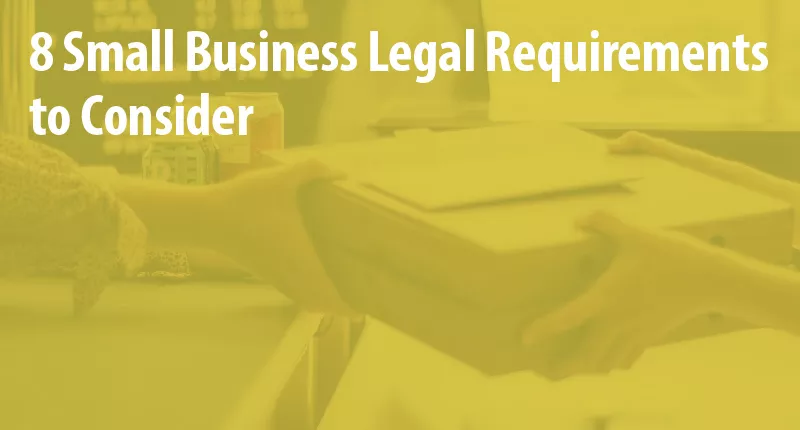
TABLE OF CONTENTS
If you’re considering starting a business, there are some small business legal requirements to consider. Recently, business regulations have come to the forefront as so many people are pursuing their dreams and opening a small business. In fact, almost 40% more people applied for a business license this year than last. With this increase in businesses, the need to understand business regulations becomes greater. If you’re looking to understand the legal requirements of starting a small business, we’ve got you covered. Read on to learn about each business regulation in order to make sure your new venture is legally sound.
The Top Legal Requirements for Starting a Small Business

If you have decided to start your own small business, congratulations! As with anything in life, there are various considerations to be mindful of. Not only that, but these small business legal requirements ensure you follow the law and set your business up for success. Additionally, they help you avoid hefty fees and penalties for failing to do your due diligence beforehand. Thankfully, it’s relatively easy to avoid many of the common mistakes that could lead to fines and legal issues down the road.
1. Determine your business structure
The legal requirements for starting a small business start with selecting the business structure you will operate under. Above all, the most common business structures according to the Small Business Administration are:
Sole proprietorship
If you are conducting business activities but haven’t registered your business yet, you fall into this category by default. With this structure, you are the sole owner of the business and have full control over any and all operations and assets. In addition, you are personally liable for all debts and obligations. Because you do not have a separate business bank account, you will only need to file and pay personal and self-employment taxes.
Partnership
This structure is ideal for a business with two or more owners. There are two types of partnerships to choose from:
- Limited Liability Partnership (LLP). Here, one partner has unlimited liability and the other partners have limited liability. The partner with unlimited liability has the most control over the business in this format. They must also pay self-employment taxes.
- Limited Partnership (LP). With this option, all partners have limited liability. One of the benefits of an LP over an LLP is it protects each partner against debts from other partners. This prevents other partner’s actions from affecting them.
Corporation (C Corp)
A corporation is a separate legal entity. This structure allows the corporation to earn profits, be taxed, and assume liability for any legal issues that may arise. C Corps are their own entities. Because of this, this type of structure is most protective of its owners from personal liability.
Limited liability company (LLC)
This is a fusion between the Corporation and Partnership structures with a unique set of business regulations. If the LLC fails or must declare bankruptcy, your personal assets stay protected. Members of an LLC are viewed as self-employed. Additionally, each member must pay self-employment taxes. Profits and losses will go to personal income as personal tax or corporate tax.
Non-profit organization
If you would like to open a tax-exempt business solely to benefit the public, the non-profit structure is for you. For example, charities, educational facilities, religious spaces, and scientific research organizations are non-profits. However, there are specific regulations in regards to how profits can be used. Make sure to thoroughly research this option.
2. Register Your Business

The next legal requirement you must make is registering your business name. It’s important to note that before you can register a name, you must do a bit of homework and first make sure that the name you choose is not already being used in your state. Moreover, it’s important to choose a name that accurately reflects the type of product/service that you offer. Once you are 100% sure you have a unique moniker, go ahead and register the business name.
There are four different components to registering a name:
- Entity name: You will apply and register the name at the state level
- Trademark: You can protect your business on a federal level to ensure no one else can have your unique name in the U.S.
- Doing Business As (DBA): While this offers no protection for your business name, your industry or state may request one
- Register your domain name: If you would like a website URL with the same name as your business, claim it online by purchasing the domain
3. Understand the legislature/guidelines for your business
Small business legal requirements are in place to help business owners succeed. After you have registered your business entity name, you can now move onto other necessary aspects of legally setting up your business.
Opening a business bank account will be necessary to separate your personal finances from those of your business. According to ethical standards and best practices, business activity and personal activity cannot comingle into the same account depending on your structure. You will need your EIN, which you receive after registering your business with the IRS. That being said, this does not apply if you are a sole proprietorship. In that case, you will use your SSN.
4. Get any required permits or licenses
Depending on what industry your business operates in and its location, business regulations may call for permits at the state and/or federal level. Check out this list of licenses and permits specific to certain industries. Your business will not last very long if you’re operating it unlawfully without a license.
5. Sort out your taxes
Every state has different tax requirements business owners must follow and fully comply with to avoid legal issues. It’s wise to speak to a local tax professional who can help you understand what the various tax requirements are for the services or goods you sell. In today’s world, laws pertaining to taxes are constantly changing. Because of this, enlisting the help of a tax professional is highly important.
6. Understand liability insurance
Depending on your business structure and product or service you offer, you may have to acquire certain forms of insurance. Business insurance protects you as an owner if personal liability protection is not enough to cover your personal and/or business assets. This is vital when considering small business legal requirements.
There are three main types of insurance to know:
- General Liability Insurance: This policy protects your business in the event of lawsuits, judgments, liens against the business, property damage, medical issues, or financial loss
- Commercial Property Insurance: Whether they are caused by mother nature, theft/vandalism, or an accident, this will protect the business from any losses or damages that occur on the property
- Product Liability insurance: If the entity sells products, this type of insurance will protect you as the owner in the unfortunate event the product injures a user or is defective
7. Follow PCI compliance laws
If you sell your products or services online, you have probably heard of PCI DSS Compliance. This stands for “Payment Card Industry Data Security Standards.” Because of the prevalence of online data fraud, these standards and protocols are in place to make the checkout experience secure. In addition, they teach business owners how to safely store transaction information, and help avoid credit card breaches. This PCI Compliance guide is a great resource on the topic and will help you make sure you are compliant.
8. Consider legal counsel
The legal requirements for starting a small business are vast. If you want to make sure no stone is left unturned and each step in the process is completed properly, enlisting the help of an attorney is a great idea.
Business regulations are always changing and vary greatly from state to state. Working with a local legal professional can save you time and money in the long run. This will help you avoid innocent legal issues and penalties that are more likely to occur if you decide to do everything on your own.
Hiring a professional business attorney who understands the laws in your state and how to navigate them for your entity will prove to be a tremendous asset.
Final Thoughts on Small Business Legal Requirements
Now that you know more about small business legal requirements, you should have more clarity on the steps involved in properly setting up your business under the law. Owning a business is a great responsibility, but one that can pay off if you make sure to follow all the necessary steps to ensure success.
Consult with a legal or tax professional in your area if you need more guidance on business regulations or help with setting up your business, and best of luck in your new endeavor.





